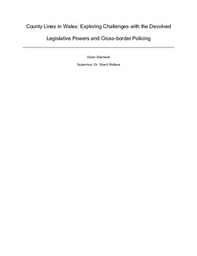Research Outline: "County Lines in Wales: Exploring Challenges with the Devolved Legislative Powers and Cross-Border Policing"
Background
County lines are defined by the National Crime Agency as illegal drugs that are "transported from one area to another, often across police and local authority boundaries (although not exclusively), usually by children or vulnerable people who are coerced into it by gangs." This is typically from urban cities into the countryside, and may also include the transport of money and weapons for the gangs, in addition to illegal drugs.
I previously lived in a fairly rural area area in Wales, and was surprised by the ease at which people I knew were able to get their hands on illegal drugs. Through this research project, I aim to better lay out why county lines have become such a vast and prevalent problem in the UK, particularly in Wales, and also to provide realistic solutions.
My supervisor is Dr. Stuart Wallace, an Associate Professor at the University of Leeds School of Law.
Causes and Hypothesis
My research will focus on whether devolution for the Senedd, the Welsh parliament, should be expanded to include legislating on crime and policing. Currently, legislating on this is considered a 'reserved matter,' meaning that only Westminster can change laws on crime and policing (unlike Scotland and Northern Ireland, who do have this power devolved). I hypothesise that if this power were to be devolved, the Senedd could create a tailored Welsh approach to dealing with county lines that may be more effective than the current model. This is because Wales is more rural and poorer than England, resulting in an arguably severer impact, and I hypothesise that a focused approach on Wales can help address this.
Additionally, cross-border policing between constabularies is a hindrance to tackling county lines. The transport of drugs in county lines is typically done via railways, crossing the jurisdictions of multiple constabularies. As a result, it is difficult to coordinate between the constabularies. For example, from London to the Vale of Glamorgan, Wales, crosses five constabularies. Although nation-wide policing agencies, like the British Transport Police, exist, I hypothesise the main problem lies with agencies and constabularies not coordinating with each other in an effective manner.
Method and Goal
My research will involve reading independent and government articles and reports, police records from various constabularies and agencies, and sending Freedom of Information requests to relevant authorities. I will also contact all major political parties in Wales to gain insight on how they would tackle county lines: Welsh Conservatives, Plaid Cymru, Welsh Liberal Democrats, The Wales Green Party, and Reform UK. Additionally, I will contact the incumbent Welsh Labour on their role in the County Lines Programme, which the new Labour government began in July 2024. My research report will conclude with realistic and implementable proposals that, once published by the Laidlaw Foundation, I will send to each of the major political parties in Wales that I had previously contacted, with the hope that some of the recommendations will be considered and enacted.


Please sign in
If you are a registered user on Laidlaw Scholars Network, please sign in